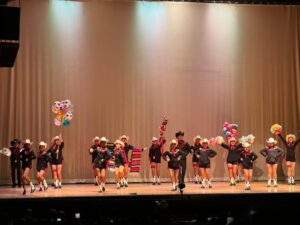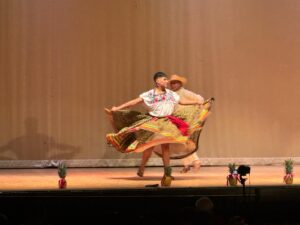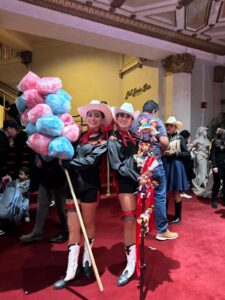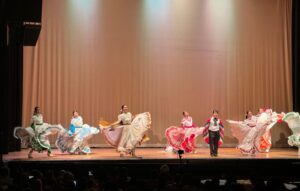
By Pamela Cruz with reporting by Anna Lee Mraz. Peninsula 360 Press.
Surrounded by flowing dresses, colors, footwork, and lots of partying, sociologist Anna Lee Mraz interviewed teacher Blanca Araceli Soto, who is currently leading an incredible folkloric ballet festival taking place in Fresno, California.
Anna Lee Mraz: I'm in Fresno, California, at the United Dancers Festival, a folkloric ballet festival with more than 1,500 people registered, a festival that brings together folkloric groups from all over the country, where they meet with teachers and students.
There is a show every day, there is a little shop, there are classes by region throughout Mexico; I, in particular, am taking the Hidalgo course with the teacher Netza Vidal. This festival has been going on for 45 years, it is a festival that the teacher María Luisa Colmenares started, and I am here thanks to her. Casa Circulo Cultural He was also invited by the maestro Omar Quesada who is also giving classes at the festival and we are going to perform tonight. I had the good fortune to speak yesterday with the maestro Blanca Araceli Soto, master of ceremonies for this festival and we are going to listen to her.
Blanca Araceli Soto: Well, look, I’ve been here in Los Angeles, California for 36 years. I’m from Guadalajara, Jalisco, Mexico, ever since I arrived, and one of the reasons I stayed in Los Angeles was because, in addition to it being the capital of the entertainment industry, unfortunately our working class didn’t have cultural programs, especially the southeast of Los Angeles, which is like 12 cities, and still to this day there isn’t a single theater. So, that motivated my husband and me to stay, to form an organization called Tierra Blanca Center, and to take on the task of creating cultural programs in theater, music, dance, painting, and folklore from both Mexico and Latin America, so that children and young people, whose parents often can’t travel to their countries of origin, could bring the essence of their country here to California.
English: Then I formed my dance company with which I was for almost 27 years, it closed when the pandemic hit and now I dedicate myself more to coaching actors in Spanish, for those adults or seniors who sometimes don't know how to enter the entertainment industry, film, theater and television, I teach classes for them now and I also continue to promote folklore, culture and tradition through getting involved with different movements like this one of Danzantes Unidos, it's been 45 years with the organization, but I've been in the organization for, I think, like 30; I am super happy, whenever I come to these festivals, more than the music concert festivals of you know which one, that you say, I don't understand, it steals your energy, I think that these festivals here charge you with energy, from seeing the young people, the adults and, as you saw yourself just now, of the 30 students who were there, none were born in Mexico, but Mexico is born in their hearts and that is something so beautiful that I thank the parents, the teachers, all of them who make it possible for all these children to know Mexico through music and folklore.
Anna Lee Mraz: Absolutely, and today is the first day of the Danzantes Unidos festival. What did you think?
Blanca Araceli Soto: Wow, it's a wonderful thing. I'm behind the stage, from the first group, who were all nervous, we said a little prayer and I told them: 'There are no mistakes here, it's just about enjoying, feeling and vibrating with the people' and, you know, it's not a competition, everyone here, you know, some came from Washington, others from Iowa, others from Oregon, others from here in Los Angeles, but what moves us all is our great passion for our Mexican culture.
You can feel it through every pore and you leave injected with energy. Right now the fandango continues, tomorrow the workshops continue, in the evening another concert, then the party. You say: where do they get so much energy? We do so much, we are already a bit old, but all of this is injections of pure life and a lot of positive energy.
Anna Lee Mraz: What would you recommend to someone who doesn't necessarily know much about folklore? What would you recommend to them to get closer to it?
Blanca Araceli Soto: You see, as human beings, we have this great need to feel part of, and one of the things that became international and worldwide was sharing our culture through the Day of the Dead, so when you don't know where you come from, if you can get closer to your culture, your folklore, your tradition, do it; if there isn't one where you are, create it, promote it, participate.
I think that gives us more life than many other things, there is no richer drug than getting involved in the folkloric movement.
Anna Lee Mraz: Anything else I haven't asked you that you'd like to say to the Spanish-speaking audience in the San Francisco Bay Area?
Blanca Araceli Soto: Well, likewise, all of us who say that we are Hispanic, that we are Latin American, let's show it a little more by supporting the folklore groups by participating in the local folklore groups, whether as dancers, as volunteers, as assistants, everyone needs them, not just those from Mexico, those from Latin America, those from Europe, all the folklore groups are life and culture and we don't want them to be lost.



You may be interested in: Exhibition at Caldwell Gallery explores the perspective of women artists

